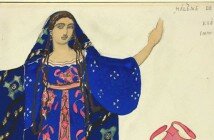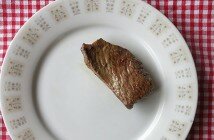1. (tara)
My sister’s man went out rabbiting, shot a trace of rabbits and a fox. Then he saw the kit. He couldn’t shoot the kit. He carried it home in his pocket and named it Tara. Tara slept in an ice-cream container and lived on tinned cat food. But she snapped, bit, teeth like little needles, my sister said. Untameable. They waited until she was big enough, until she’d outgrown the ice-cream container. Then my sister’s man carried her back out into the pines and let her go.
‘Doesn’t that defeat the purpose,’ I said.
‘What purpose?’
2. (the wrong kind)
I never saw my eyes in those moments (how could I have?) but I imagined something animal there, something unreasonable; the wrong kind of wildness. When people spoke to me it was as though they were trying to coax me out of a confined space. But it was something else that coaxed me out in the end, something voiceless. I woke alone in a house where all of my clothes were too big. I thought: Somebody has swapped all my clothes. Outside my window a potted lemon tree had died of thirst. I threw a bucket of water on it and it came back to life, just like that.
There isn’t much left of that year. Everything small enough to hold in a closed fist: the smell of gingerbread. Big Rock Candy Mountain. Another plastic bracelet with my name on it.
3. (clearing)
They’ll go up there in the summer, singing straight through the Channel to Toslow we’ll go. Hefting saws and shovels to beat back the forest, to widen the paths that grew caribou-narrow or disappeared altogether during the forty unpeopled years.
They’ll find the clearing where you and I got lost, got reminded of our smallness. The circular imprints of moose in the new grass as mysterious as crop circles.
What it meant, to become lost. To stumble defeated down the rocks and to the sea, to feel the icy Atlantic gushing over the tops of our sturdy, borrowed boots. To reach for the boat’s rope ladder with our faces still turned towards the mountain, towards great unseen things crashing through the trees.
“Notes on Wildness” originally appeared in The Canary Press and has been reprinted with permission of the author.
 Josephine Rowe is an Australian writer living in Oakland, California. Her writing has appeared in Narrative, The Iowa Review, Harvard Review, McSweeney’s Quarterly Concern and on The Paris Review Daily, and she is the author of two short story collections, most recently Tarcutta Wake (UQP, 2012). She is currently a 2014-2016 Wallace Stegner Fellow in Fiction at Stanford University. Her debut novel, A Loving, Faithful Animal, will be published in 2016.
Josephine Rowe is an Australian writer living in Oakland, California. Her writing has appeared in Narrative, The Iowa Review, Harvard Review, McSweeney’s Quarterly Concern and on The Paris Review Daily, and she is the author of two short story collections, most recently Tarcutta Wake (UQP, 2012). She is currently a 2014-2016 Wallace Stegner Fellow in Fiction at Stanford University. Her debut novel, A Loving, Faithful Animal, will be published in 2016.
More About The Canary Press












